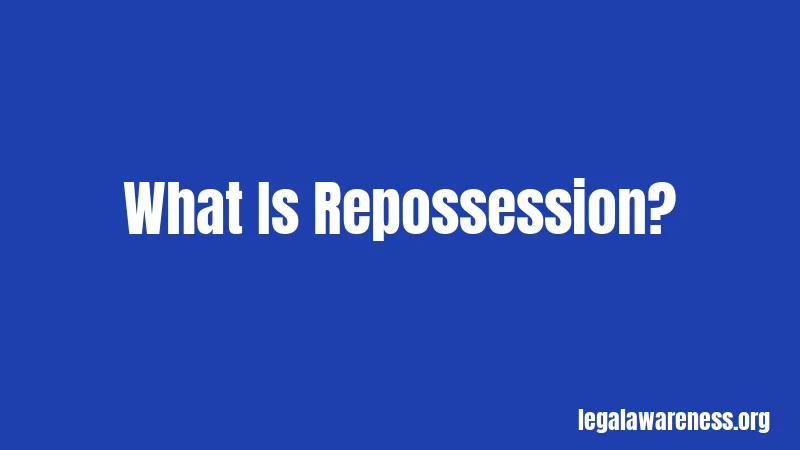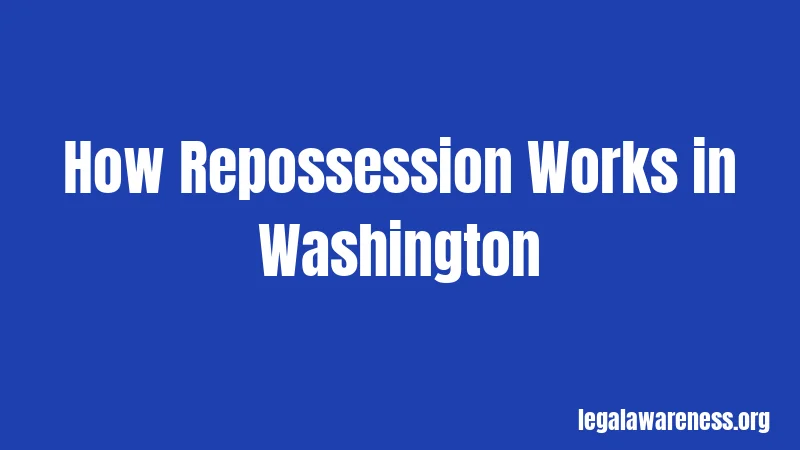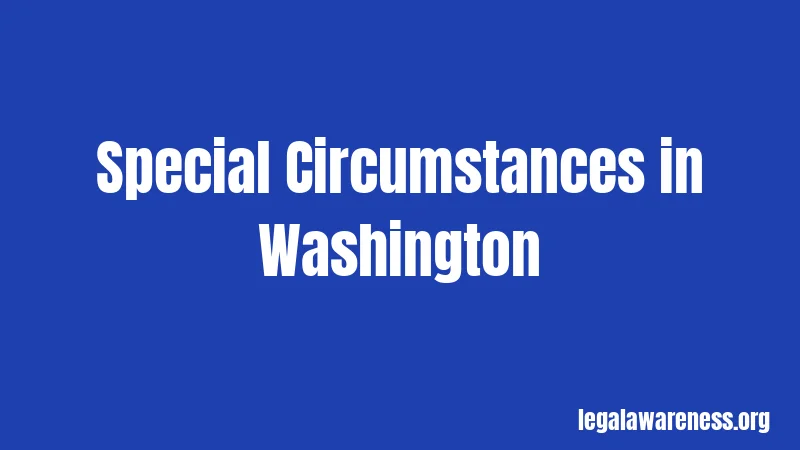Washington Repossession Laws (2026): Know Your Rights Before They Tow
You’re sitting in your driveway. You walk out to your car. It’s gone.
If your car gets repossessed, you need to know what rights you have. Most people don’t realize how much protection Washington law actually gives them. The rules might surprise you. Let’s break down exactly what happens, what’s legal, and what to do if it occurs to you.
Washington takes car repossession seriously. The state has strict laws protecting borrowers from unfair collection practices. You need to know these rules before something happens. That’s what this guide covers.
What Is Repossession?

Repossession happens when a lender takes back a vehicle you financed or leased. Honestly, this is probably the biggest financial threat for people with car loans. The lender typically hires a company to retrieve the vehicle when you fall behind on payments.
Here’s the thing: a lender can’t just grab your car whenever they want. Washington law requires them to follow specific rules. They must respect your rights as a consumer. Breaking these rules can cost them serious money in damages.
Basic Washington Repossession Laws
When Can a Lender Repossess Your Car?
A lender can only repossess your vehicle if you’re in default. Default means you’ve missed one or more payments. It’s not always just one missed payment either.
Your loan agreement spells out when default happens. Most agreements say default occurs after one or two missed payments. Read your contract carefully to know your specific terms. Don’t assume anything about your situation.
Here’s the important part: before they repossess, the lender must typically send you a written notice. This notice tells you about the missed payment and your right to catch up. You usually have time to make things right.
The Notice Requirement
Wondering what kind of notice they need to give you? It depends on your loan type.
For most auto loans in Washington, creditors must provide clear notice of default. The notice should explain what you owe and how much time you have to fix it. This isn’t some tiny fine print. The notice has to be obvious and understandable.
Usually, you get at least 10 to 30 days before repossession happens. Your loan agreement will specify the exact timeframe. Check your contract right now if you’re behind on payments. The timeline matters.
Right to Cure
This is huge. You have the legal right to catch up on missed payments before repossession.
This is called the right to cure. If you’re behind, you can make up the missed payments and keep your car. The lender can’t repossess if you cure the default within the allowed time.
Let’s say you’re 60 days late on a payment. You can call the lender today and ask what it costs to catch up. Pay that amount, and legally, repossession should stop. You stay in your vehicle.
How Repossession Works in Washington

Legal Repossession Methods
Okay, pause. This part is important because it determines whether a repossession is actually legal.
In Washington, repossession companies can’t use excessive force. They can’t break into your home, break your car windows, or threaten you. They can’t damage your property (beyond what’s needed to access the vehicle). This is called the “breach of peace” rule.
If a repossession agent breaches the peace, you can sue them. You can recover actual damages plus additional damages for the wrongful conduct. We’re talking hundreds or thousands of dollars in some cases.
What counts as a breach of peace? If they tow your car while you’re sitting in it, that’s illegal. If they break a window to access your vehicle, that’s illegal. If they threaten you verbally, that’s illegal. If they damage your property unnecessarily, that’s illegal.
The repossession has to be calm and non-threatening. The agent should identify themselves and explain what they’re doing. If you object, they generally have to stop and contact the lender.
Where They Can Repossess
A repossession company can take your car from public spaces. Your driveway? That’s public enough. A parking lot? Fair game. A street? Absolutely.
But there are limits. They can’t trespass onto private property to get your car. If you have a gate or “no trespassing” sign, they can’t enter. If your car is in a locked garage, they can’t break in.
What about your apartment complex? This gets tricky. If there’s a locked gate and you have the right to exclude others, they likely need permission to enter. If it’s an open complex, they probably can repossess from there.
Timeline After Repossession
Hold on, this matters. After they take your car, things move quickly.
The lender must provide you with certain information. They need to tell you the location of your vehicle. They need to tell you about sale procedures. They need to give you notice of any surplus or deficiency.
You usually have a window to redeem your vehicle. Redemption means buying back your car by paying the full loan balance, plus repossession and storage costs. This window is often shorter than you’d think. Sometimes it’s only 10 days.
If you don’t redeem the vehicle, the lender will likely sell it at auction. After the sale, if money is left over after expenses and the loan balance, you get that money back. If there’s a shortfall, the lender might sue you for the difference. This is called a deficiency claim.
Penalties for Illegal Repossession
What Happens If the Lender Breaks the Law
This is where it gets real. If a lender or repossession company violates Washington law, you have legal recourse.
You can sue for wrongful repossession. The damages can include actual losses (like the difference in what you could have sold the car for) plus emotional distress damages. The law even allows “statutory damages” in some cases.
If they breach the peace, you might recover $500 to $5,000 or more. It depends on the severity and the judge’s decision. Some cases result in even larger awards.
There’s more. You can recover attorney fees if you win your case. This makes it practical to hire a lawyer to fight back. The lender pays for your legal costs.
Class Action Possibilities
Personally, I think this is important to know. If a lender is breaking the law with lots of people, a class action lawsuit becomes possible.
Multiple people can band together against the same lender. One successful claim against a big repossession company could affect thousands of borrowers. Check if there’s already a class action against your lender.
Special Circumstances in Washington

Deficiency Liability
Let’s talk about something that trips up a lot of people. After your car sells at auction, there’s often a gap.
Say you owe $15,000 on a car loan. The car gets repossessed and sold for $10,000. That $5,000 difference is called a deficiency. The lender can sue you to collect this amount.
Washington allows deficiency judgments. The lender can get a court order forcing you to pay. Your wages could be garnished. Your bank account could be seized. It’s serious stuff.
Here’s the catch though. The lender has to sell your vehicle in a “commercially reasonable manner.” If they sell it too cheaply or don’t advertise it properly, a court might not allow the deficiency. This is your protection.
Military Members Get Extra Protection
If you’re on active military duty, you have additional protections under federal law. The Servicemembers Civil Relief Act limits interest rates and provides repossession protections.
Lenders generally can’t repossess from active military members without a court order. There are specific procedures they must follow. If you’re serving, mention this to your lender immediately if you’re struggling with payments.
Lease vs. Loan Repossession
Not sure if you’re leasing or financing? The rules differ slightly.
If you’re leasing, the car belongs to the leasing company. They can repossess more easily if you default. But they still can’t breach the peace. They still need to provide proper notice.
If you’re financing, you own the car (though the lender has a lien). The repossession rules I’ve explained apply fully to you.
Penalties and Financial Consequences
Repossession Costs
Okay, here’s where it gets expensive. When they repossess your car, you’re on the hook for costs.
The repossession itself usually costs $300 to $500. Storage fees add up quickly, sometimes $25 to $50 per day. The tow company charges these fees. You have to pay them even if you redeem the vehicle.
By the time you redeem, you might owe thousands just in fees. This is beyond the actual loan balance. It adds up fast. Stay ahead of your payments to avoid this.
Interest and Late Fees
Your loan agreement likely allows the lender to charge late fees. These are usually a percentage of your payment. Interest continues to accrue on the balance.
If you’re 30 days late, you might have a late fee plus extra interest. If you’re 60 days late, the fees grow larger. If you’re 90 days late, the fees are substantial. By the time repossession happens, your total debt has increased significantly.
Credit Score Damage
This one hits hard. A repossession destroys your credit score.
Your score could drop 100 to 150 points immediately. That impacts your ability to borrow for years. Car loans become harder to get. Mortgages become nearly impossible. Even credit card companies will reject you.
A repossession stays on your credit report for seven years. That’s a long time to recover. Prevention is way better than dealing with the aftermath.
Deficiency Judgment and Wage Garnishment
If there’s a deficiency after the sale, the lender can sue. If they win, they get a judgment.
A judgment allows them to garnish your wages. In Washington, a judgment creditor can take up to 25% of your disposable income. They can also freeze your bank account or place a lien on property.
This is legally serious. The lender can pursue this for years. It’s one of the worst financial situations you can face.
How to Avoid Repossession
Communicate With Your Lender
You’re not alone in this. Thousands of people fall behind on car payments. Lenders know this happens.
Call your lender immediately if you’re struggling. Don’t wait until you’re three months behind. Most lenders have hardship programs. They might allow deferment, forbearance, or loan modification.
Tell them your situation. Ask about payment plans or reduced payment options. Many lenders prefer working something out to repossessing. It’s cheaper for them too.
Loan Modification
This is basically refinancing your existing loan with new terms. Your lender might extend the loan period, lowering your monthly payment. They might reduce the interest rate.
Not all lenders offer modification, but many do. It’s worth asking. A modified loan keeps you in your car and helps you catch up on missed payments.
Refinancing
If your credit is decent, consider refinancing with a different lender. A new car loan could have better terms. You could lower your monthly payment significantly.
Shop around with multiple lenders. Credit unions often have better rates than traditional banks. Online lenders now compete aggressively for borrowers.
Surrender the Vehicle
This one’s tough but sometimes practical. You can voluntarily surrender your vehicle to the lender.
When you surrender, you avoid the shame and stress of repossession. The credit damage is still serious, but slightly less severe than forced repossession. You also avoid extra repossession and storage fees.
The deficiency situation is still possible, but negotiating is easier with voluntary surrender. The lender might be more willing to forgive a deficiency if you cooperate.
How to Respond to Repossession
If Your Car Is Being Repossessed Right Now
Stay calm. Don’t physically interfere with the repossession agent. You can’t legally stop them, and trying creates safety risks.
Ask for identification. Get their name and company. Document everything. Take photos of the date, time, and location. Note any damage to your property.
Get the phone number for the repossession company. Get the lot address where they’re taking your car.
Exercising Your Right to Redeem
Remember the right to cure? After repossession, you have the right to redeem.
Contact the lender immediately. Ask what the redemption amount is. This includes the loan balance, late fees, repossession costs, and storage fees. Get this in writing.
Redemption windows are short. You might have only 10 days. Act fast. Get the money together and pay. Your car comes back to you.
Reviewing the Sale Process
After your car is sold, request documentation. You deserve to see how much it sold for and what expenses were deducted.
Check if the sale was truly “commercially reasonable.” Did they advertise it? Did they give reasonable notice? Did they hold a public auction or private sale?
If the sale wasn’t proper, you might challenge the deficiency. A lawyer can review this. Many offer free consultations.
What If You Can’t Afford Your Car Payment?
Seek Legal Help Early
If you’re struggling, get legal advice before the problem gets worse. Many attorneys offer free consultations. Legal aid organizations help low-income folks.
A lawyer can review your loan agreement. They can explain your rights. They can respond to any legal action. Early help is way cheaper than fighting repossession later.
Contact a Credit Counselor
Non-profit credit counseling agencies help people in your situation. They’re free or low-cost. They negotiate with creditors on your behalf.
A counselor can help you create a budget. They can arrange a debt management plan. They can educate you about your options.
Government Assistance Programs
Some programs help with car payments. Ask your local social services office about assistance. Some nonprofits fund emergency car payment help.
This depends on your income and situation. But it’s worth investigating if you’re desperate.
Frequently Asked Questions
How many missed payments before repossession in Washington?
Usually, one or two missed payments can trigger repossession. Your loan agreement specifies the exact trigger. But lenders typically wait a few weeks to send notices. Repossession doesn’t usually happen until you’re at least 60 days late. Call your lender before it reaches that point.
Can a repossession company enter my home or garage?
No. They cannot enter locked buildings without permission or a court order. Your home is off-limits. A locked garage is off-limits. If they do, that’s trespassing, and you can sue them.
What is the redemption period in Washington?
The redemption period is typically 10 days after repossession, but check your loan agreement. Some agreements allow longer periods. Contact your lender immediately after repossession to redeem if you can pay.
Can I be sued for a deficiency in Washington?
Yes. If your car sells for less than you owe, the lender can sue for the difference. However, they must show the sale was commercially reasonable. A lawyer can help you fight an unfair deficiency claim.
What should I do if the repossession was illegal?
Document everything and contact a lawyer immediately. Take photos, gather witness statements, and keep all written communication from the repossession company. An attorney can file a lawsuit for wrongful repossession and help you recover damages.
Final Thoughts
Repossession is serious, but you’re not helpless. Washington law gives you real protections. You have the right to cure, the right to redeem, and the right to sue if they break the rules.
The best move? Stay on top of your payments. If you struggle, call your lender before things get bad. Most will work with you. Communication is key.
If repossession does happen, act fast. Know your rights. Consider talking to a lawyer. Many handle these cases for free or on contingency, meaning they only win if you do.
You’ve got options. Now you know them. Stay informed, and protect yourself.
References
Washington State Legislature – RCW 9.23 (Unlawful Practices)
Washington State RCW 62A.9-609 (Secured Transactions – Right to Repossess)
Washington State Consumer Protection Act
Federal Trade Commission – Repossession Information
Washington State Attorney General – Consumer Protection Division
